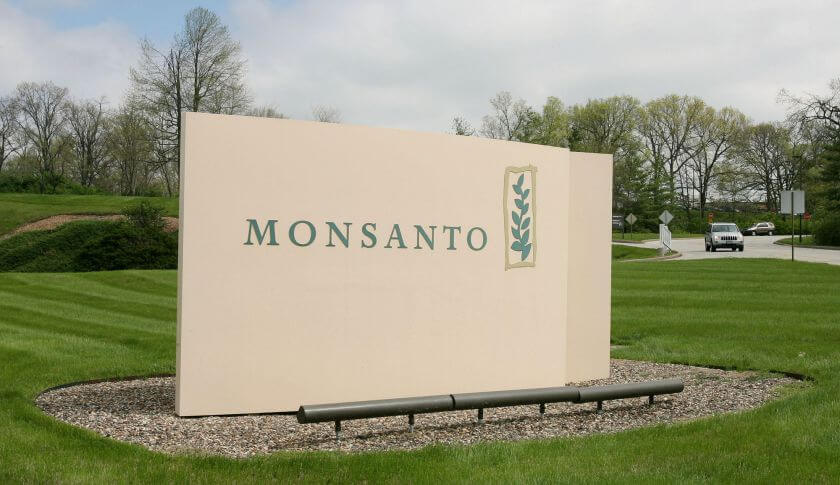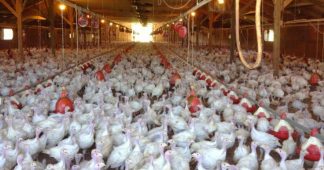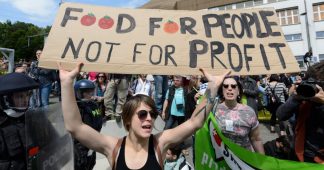By George Emmanuel
Member of the Co-ordinating Committee of the Panhelladic Initiative of Organizations and Citizens against TTIP, CETA, TISA.
In the European Commission’s 2016 report a cumulative analysis is presented of the economic consequences for the EU’s Agricultural sector of the continuing and upcoming free trade agreements between the EU and the 12 collaborating countries (USA, Canada, Latin American countries, Australia, New Zealand, Japan, Vietnam, Thailand, Turkey, Mexico, Philippines and Indonesia).
The European Union exports nearly as many products as China and more than the USA and any other country. In the agricultural and food sector particularly the EU comes first on the international markets. For many decades the EU was the chief importer of agricultural products and foods, with a great quantity of imports of raw materials for the production of meat and foodstuffs in the EU. From 2013 onwards the EU became the world’s largest exporter of agricultural products and foodstuffs, overtaking the USA. In 2010 the EU was transformed into a net exporter and since then has had a trade surplus in food. In 2015 the value of the EU’s food exports amounted to 119 billion euros, despite the significant loss of exports to one of the most important markets as a result of the Russian authorities’ ban on imports of a number of products from the EU such as meat, dairy products, fruit and vegetables. During the same period food imports came to 113 billion euros in 2015. Trade in agricultural and food products in the EU accounts for 7% of the total value of trade in the EU and comprises 25% of the EU’s total trade surplus.
Wines come first in the EU’s basket of products for export. The next most exported product is wheat, followed by dairy products. The ranking of the EU’s most exportable products is baby foods, chocolates, confectionery and other food preparations. Food imports into the EU involve a limited number of products such as agricultural raw materials for further processing, such as protein-rich animal feed, vegetable oils, raw coffee and products for immediate consumption such as nuts and fruits, either of tropical origin, or of seasonal origin from other countries. The USA and China are the biggest export market for the EU’s agricultural and food products, and the USA and Brazil the key countries of origin of the EU’s imports. It is predicted that on the international markets, and particularly those of Asia and Africa, in contrast to the stagnation of the developed countries, there will be greater demand for agricultural products than production, so that they are becoming increasingly important as a factor for maintaining EU agriculture’s outward-looking perspective.
Following the collapse of the multilateral negotiations of the World Trade Organization’s Doha round in 2011 the EU has followed the policy of concluding bilateral preferential trade agreements with other countries.
As regards the agricultural sector the various agreements, when implemented, seek to open new opportunities for the export of agricultural products and foodstuffs but also to make possible more imports. While this could be an advantage for consumers and producers employing raw materials, the increased level of imports will lead to increased competition on local markets for agricultural and food products.
According to the European Commission study on all the trade agreements with the 12 countries, analysis and evaluation focuses exclusively on market access through reduction of tariffs. Non-tariff measures, and in particular phytosanitary and geographical indications, are not taken into account in this assessment study of the economic effects of the trade agreements.
The results of this study of the overall impact of international trade agreements up to 2025 show, in relation to the projected net value of the EU’s trade balance in food (exports relative to imports):
Α) An increase in imports, the size of which will depend on the agreements on measures for the protection of health and the qualitative standards proposed:
- Of dairy products, chiefly from the USA and New Zealand,
- Of cattle and sheep meat, chiefly from the USA, Latin America and Australia,
- Of poultry, from countries of the Americas and Thailand,
- Of soya from the USA,
- Of rice from the USA and Thailand,
- Of sugar from Latin America,
- Of fruit and vegetables from Latin America,
Β) A trade balance with wine, with the net position depending on the agreements on geographical and protected-designation-of-origin indications over competing products from the US and Latin America.
- C) An increase in exports, the size of which will depend on the agreements on health protection measures and protected-designation-of-origin and geographical indications.
- Of hard and soft wheat to Turkey,
- Of cheese to the countries of the Americas and Japan,
- Of pig meat to the countries of the Americas, Japan and Australia.
All the above make it necessary for the movement to intervene in the negotiations, chiefly regarding CETA (for there to be a vote against it in the European Parliament on 15th February) and TTIP, for protection from the EU and the Greek government of our sensitive strategic products, including by non-tariff means, i.e. defence of protected-designation-of-origin and protected-geographical-indications that will prevent the import of genetically modified products and products that employ hormones, antibiotics and chlorine in imported meat. We must resist the speculative policies of the cartels of multi-national companies and promote democratic institutions (co-operative producer groups, interprofessional organizations, local markets) and policies of decentralization, localization and sustainable development of local communities. Defend the European Community’s precautionary principle, agricultural and food safety and consumer protection standards through maintenance of the public nature of quality control mechanisms and public arbitration to resolve commercial disputes.











